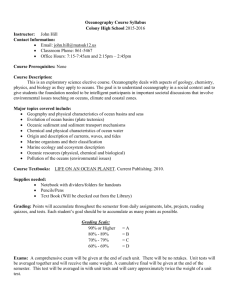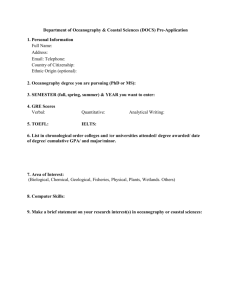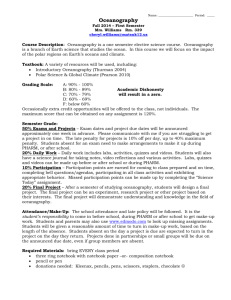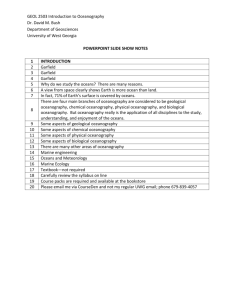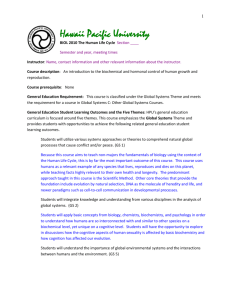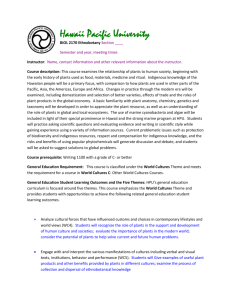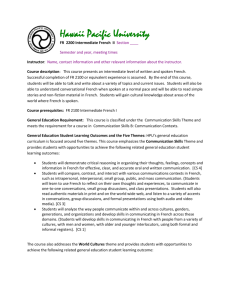Hawaii Pacific University
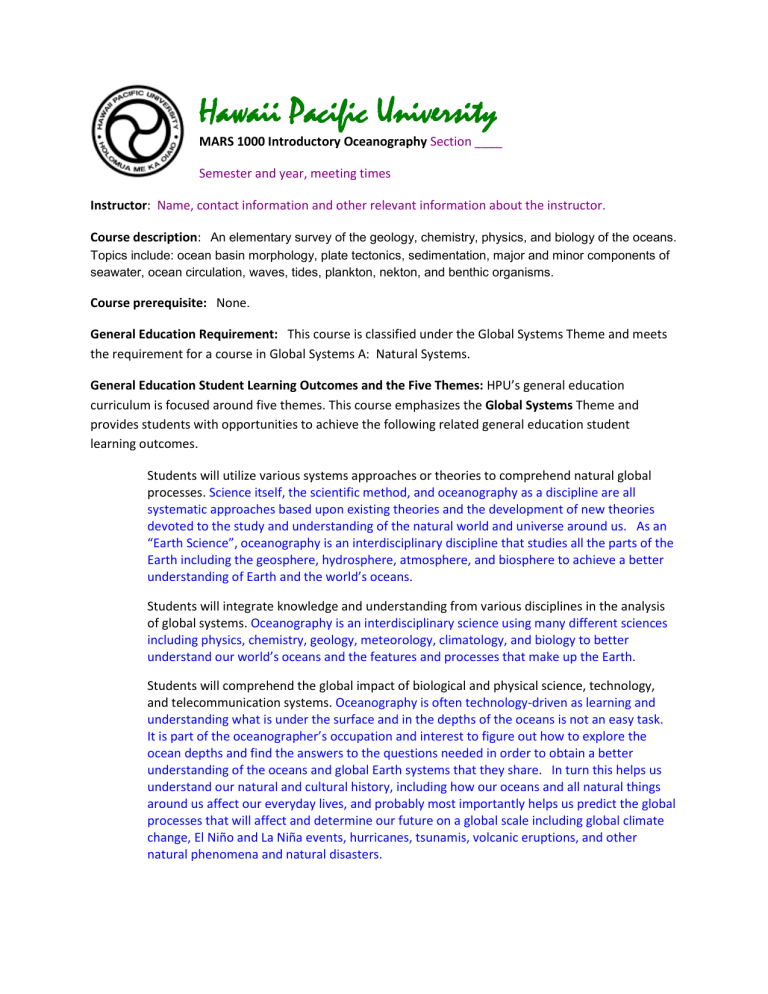
Hawaii Pacific University
MARS 1000 Introductory Oceanography Section ____
Semester and year, meeting times
Instructor: Name, contact information and other relevant information about the instructor.
Course description: An elementary survey of the geology, chemistry, physics, and biology of the oceans.
Topics include: ocean basin morphology, plate tectonics, sedimentation, major and minor components of seawater, ocean circulation, waves, tides, plankton, nekton, and benthic organisms.
Course prerequisite: None .
General Education Requirement: This course is classified under the Global Systems Theme and meets the requirement for a course in Global Systems A: Natural Systems.
General Education Student Learning Outcomes and the Five Themes: HPU’s general education curriculum is focused around five themes. This course emphasizes the Global Systems Theme and provides students with opportunities to achieve the following related general education student learning outcomes.
Students will utilize various systems approaches or theories to comprehend natural global processes.
Science itself, the scientific method, and oceanography as a discipline are all systematic approaches based upon existing theories and the development of new theories devoted to the study and understanding of the natural world and universe around us.
As an
“Earth Science”, oceanography is an interdisciplinary discipline that studies all the parts of the
Earth including the geosphere, hydrosphere, atmosphere, and biosphere to achieve a better understanding of Earth and the world’s oceans.
Students will integrate knowledge and understanding from various disciplines in the analysis of global systems. Oceanography is an interdisciplinary science using many different sciences including physics, chemistry, geology, meteorology, climatology, and biology to better understand our world’s oceans and the features and processes that make up the Earth.
Students will comprehend the global impact of biological and physical science, technology, and telecommunication systems. Oceanography is often technology-driven as learning and understanding what is under the surface and in the depths of the oceans is not an easy task.
It is part of the oceanographer’s occupation and interest to figure out how to explore the ocean depths and find the answers to the questions needed in order to obtain a better understanding of the oceans and global Earth systems that they share. In turn this helps us understand our natural and cultural history, including how our oceans and all natural things around us affect our everyday lives, and probably most importantly helps us predict the global processes that will affect and determine our future on a global scale including global climate change, El Niño and La Niña events, hurricanes, tsunamis, volcanic eruptions, and other natural phenomena and natural disasters.
Students will understand the importance of global environmental systems and the interactions between humans and the environment. Global environmental systems are critical for the survival of all life on planet Earth including our own. Humans, plants and animals share residence in our Earth system and depend upon global systems, natural resources, and processes to sustain themselves. More and more the processes shaping
Earth’s environment are being influenced by humans and one of the great things about oceanography is working towards a better understanding of these human-environment interactions. All of the course specific learning outcomes address this area while learning outcomes #3, #4, and #5 focus in on the specifics of human-environment relations. Examples of human-environment relations in oceanography where humans are impacting the environment include global warming, ozone depletion, thermohaline circulation, energy conversion technologies, desalination, land and sea mining, shoreline development, increased sedimentation and fresh-water runoff, sewage disposal, other pollution, and over harvesting of marine fisheries, to name just a few. This course addresses most if not all of these at various levels of detail and complexity.
Optional: Discuss below how your course addresses five themes other than by delivering the general education outcomes mentioned above. See the example below: delete this note once the syllabus is complete. It is not required to talk about the other themes.
Although MARS 1000 emphasizes Global Systems, the course is also relevant to the themes of
Communication Skills, Values and Choices and Research and Epistemology.
Communication Skills: In this course students will write two short review papers and learn how to interpret, evaluate, and present scientific information related to oceans in small groups and larger class discussions.
Values and Choices: Through the study of oceanography, students will learn how living things use their resources and deal with varying physical and biological phenomena. This in turn helps us understand values (both positive and negative) that people place on certain physical features and phenomena that exist around us. With this knowledge of values and how values are formed, it is much easier for students to make informed decisions or choices and be aware of the potential consequences that go along with choices and their alternatives.
Research and Epistemology: Students will research an oceanographic topic of their choice with other students that have similar interests and present a final group project oral presentation of their research findings.
Note: Purple text shows places where specific course information must be filled in. Red text contains explanatory notes to the instructor which should be deleted before using the syllabus. Blue explanations above should be rephrased as needed by the individual instructor to reflect the specific approach in that section of the course. Course specific outcomes below are an example and may also be rephrased or modified by the instructor.
Student Learning Outcomes for MARS 1000 Introductory Oceanography
At the end of this course, the students who have studied and applied themselves to the course material will have developed:
1) A thorough understanding of science, the scientific method, and the study of oceanography,
2) An understanding of what oceanographers do, including integrating knowledge and understanding from various disciplines in the analysis of the oceans and global systems,
3) An understanding of the Earth as a system, its subsystems, and various systems approaches or theories to comprehend global systems and processes.
4) An understanding of the importance of the oceans, global environmental systems, and the interactions between humans and the environment,
For the rest of these required syllabus items see the details in the faculty handbook. Delete this note once the syllabus is complete. For online courses there are some additional requirements given at this link.
Texts List textbooks with ISBN’s and include this language as well
All textbook information (pricing, ISBN #, and e-books) for this course can be found on the HPU
Bookstore website: hpu.edu/bookstore.
If you have any questions regarding textbooks, please contact the HPU Bookstore at:
Phone: 808-544-9347
Or e-mail: jyokota@hpu.edu
mmiyahira@hpu.edu
Assignments and mode of evaluation
Summary of important dates and deadlines (if the schedule is a separate document and due dates are not given with the description of the assignments).
Class rules and policies (including regarding attendance, late work and academic dishonesty)
Schedule of events (may be attached separately)
